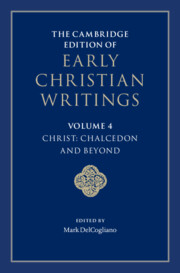Book contents
- The Cambridge Edition of Early Christian Writings
- The Cambridge Edition of Early Christian Writings
- The Cambridge Edition of Early Christian Writings
- Copyright page
- Contents
- Notes on Contributors
- Acknowledgments
- Note on the Texts and Translations
- Abbreviations
- Series Introduction
- Introduction
- Part I The Council of Chalcedon and Its Reception
- 1 Acts of the Home Synod at Constantinople (November 448):
- 2 Eutyches, Letter to Leo of Rome
- 3 Leo of Rome, Tome to Flavian of Constantinople
- 4 Acts of the Council of Chalcedon (October 451):
- 5 Leo of Rome, The Second Tome (Letter to Emperor Leo)
- 6 Timothy Aelurus, Petition to Emperor Leo
- 7 Timothy Aelurus, Against the Council of Chalcedon
- 8 Timothy Aelurus, Letter to Claudianus
- 9 Emperor Zeno, The Henotikon
- 10 Pseudo-Dionysius the Areopagite, Fourth Letter
- 11 Narsai, Metrical Homily on “the Word became Flesh” (John 1:14)
- 12 Narsai, Selections from the Metrical Homilies on the Nativity and on the Epiphany
- 13 Philoxenos of Mabbug, Letter to the Monks of Senoun (Selections)
- 14 Jacob of Serugh, Metrical Homilies on the Name “Emmanuel” and on How the Lord is Known in Scripture as Food and Drink
- 15 Jacob of Serugh, Metrical Homily on the Council of Chalcedon
- 16 Jacob of Serugh, Letter 14
- 17 Simeon of Beth Arsham, Letter on Bar Ṣawmā and the Heresy of the Nestorians
- 18 Emperor Justinian, Edict on the Orthodox Faith (Selection)
- 19 Acts of the Second Council of Constantinople (May–June 553):
- Part II Christological Perspectives after Constantinople II
- Suggestions for Further Reading
- Scriptural Index
4 - Acts of the Council of Chalcedon (October 451):
Selected Proceedings and the Chalcedonian Definition
from Part I - The Council of Chalcedon and Its Reception
Published online by Cambridge University Press: 11 February 2022
- The Cambridge Edition of Early Christian Writings
- The Cambridge Edition of Early Christian Writings
- The Cambridge Edition of Early Christian Writings
- Copyright page
- Contents
- Notes on Contributors
- Acknowledgments
- Note on the Texts and Translations
- Abbreviations
- Series Introduction
- Introduction
- Part I The Council of Chalcedon and Its Reception
- 1 Acts of the Home Synod at Constantinople (November 448):
- 2 Eutyches, Letter to Leo of Rome
- 3 Leo of Rome, Tome to Flavian of Constantinople
- 4 Acts of the Council of Chalcedon (October 451):
- 5 Leo of Rome, The Second Tome (Letter to Emperor Leo)
- 6 Timothy Aelurus, Petition to Emperor Leo
- 7 Timothy Aelurus, Against the Council of Chalcedon
- 8 Timothy Aelurus, Letter to Claudianus
- 9 Emperor Zeno, The Henotikon
- 10 Pseudo-Dionysius the Areopagite, Fourth Letter
- 11 Narsai, Metrical Homily on “the Word became Flesh” (John 1:14)
- 12 Narsai, Selections from the Metrical Homilies on the Nativity and on the Epiphany
- 13 Philoxenos of Mabbug, Letter to the Monks of Senoun (Selections)
- 14 Jacob of Serugh, Metrical Homilies on the Name “Emmanuel” and on How the Lord is Known in Scripture as Food and Drink
- 15 Jacob of Serugh, Metrical Homily on the Council of Chalcedon
- 16 Jacob of Serugh, Letter 14
- 17 Simeon of Beth Arsham, Letter on Bar Ṣawmā and the Heresy of the Nestorians
- 18 Emperor Justinian, Edict on the Orthodox Faith (Selection)
- 19 Acts of the Second Council of Constantinople (May–June 553):
- Part II Christological Perspectives after Constantinople II
- Suggestions for Further Reading
- Scriptural Index
Summary
The Council of Chalcedon was the culmination of a series of synods that met in the wake of Cyril’s death in 444 amid disputes over his legacy. At the Home Synod at Constantinople in November 448, Eusebius of Dorylaeum instigated the condemnation of Eutyches. After Eutyches appealed the synod’s decision, two inquiries were held in April 449, to investigate whether the minutes of the Home Synod had been falsified and whether Flavian had written his condemnation of Eutyches before the archimandrite had even appeared at the synod. This investigation resulted in the decision to hear Eutyches’s appeal at the second Council of Ephesus (Ephesus II) in August 449, which Emperor Theodosius II had convened to address whatever issues he understood to remain in the Nestorian controversy and affirm the faith of Nicaea and Ephesus I.
- Type
- Chapter
- Information
- The Cambridge Edition of Early Christian Writings , pp. 49 - 116Publisher: Cambridge University PressPrint publication year: 2022

